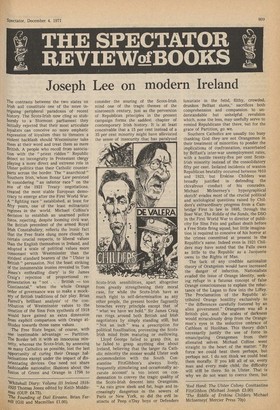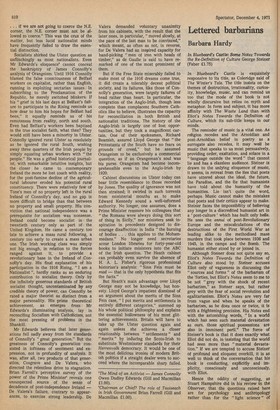Joseph Lee on modern Ireland
The contrasts between the two states on Irish soil constitute one of the more intriguing peripheral paradoxes of recent history. The Scots-Irish now cling so stubbornly to a Stormont parliament they Initially rejected that their most articulate loyalists can conceive no more emphatic expression of loyalism than to threaten a violent backlash should Westminster take them at their word and treat them as mere British. A people who recoil from association with the "priest ridden" Republic detect no incongruity in Protestant clergy Playing a more direct and extreme role in Ulster politics than their Catholic counterparts across the border. The "anarchical " Southern Irish, whom Bonar Law persisted In considering "an inferior race" on the eve of the 1921 Treaty negotiations, created the most stable European democracy to emerge after the First World War. A " fighting race " established, at least for fifty years, one of the least militaristic regimes in the world. Michael Collins's decision to establish an unarmed police force, rejecting, despite looming civil war, the British precedent of the armed Royal Irish Constabulary, reflects the ironic fact that the Free State clung more closely, in certain crucial respects, to liberal values than the English themselves in Ireland, and adopted a scale of political values more Consonant with Westminster than the strident standard bearers of the " Ulster is British" persuasion. Not the least striking of the innumerable ironies revealed in Tom Jones's enthralling diary' is Sir James Craig's rejection of proportional representation as "not . . . British — too Continental," when the whole Orange order of governance was to make a mockery of British traditions of fair play. Brian Parrell's brilliant analysisof the contribution of Westminster values to the creation of the Sinn Fein synthesis of 1918 would have gained an extra dimension from explicit comparison with Orange attitudes towards those same values.
The Free State began, of course, with One inestimable advantage — Partition. The Border left it with an innocuous minority, whereas the Scots-Irish, by annexing as many Catholics as possible, lost the last oPportunity of curing their Orange hallucinations except under the impact of disorientating devices. One need not share fashionable nationalist illusions about the fusion of Green and Orange in 1798 to consider the souring of the Scots-Irish mind one of the tragic themes of the nineteenth century, just as the perversion of Republican principles in the present campaign forms the saddest chapter of contemporary Irish history. It is at least conceivable that a 15 per cent instead of a 35 per cent minority might have alleviated the sense of insecurity that has paralysed Scots-Irish sensibilities, apart altogether from greatly strengthening their moral case, for while the Scots-Irish have as much right to self-determination as any other people, the present border flagrantly breaches every principle except that of "what we have we hOld." Sir James Craig ran rings around both British and Irish negotiators by simply standing still, but "Not an inch" was a prescription for political fossilisation, preventing the ScotsIrish mind from maturing or mellowing.
Lloyd George failed to grasp this, as he failed to grasp anything else about Ireland, believing that the larger its Catholic minority the sooner would Ulster seek accommodation with the South. Constantine FitzGibbon's always lively, frequently stimulating and occasionally accurate account' is too intent on condemnation to convey the tragic quality of the Scots-Irish descent into Orangeism. "As rats grow sleek and fat, huge and increasingly dangerous in the sewers of Paris or New York, so did the evil instincts of Peep o'Day boys or Defenders luxuriate in the fetid, filthy, crowded, drunken Belfast slums," sacrifices both comprehension and compassion to understandable but unhelpful revulsion which, none the less, may usefully serve to remind Republicans that there, but for the grace of Partition, go we.
Southern Catholics are usually too busy thanking God they are not Orangemen in their treatment of minorities to ponder the implications of confrontation, exacerbated by Belfast's inter-war unemployment rates, with a hostile twenty-five per cent ScotsIrish minority instead of the consolidatory fifty per cent. Isolated incidents of wanton Republican brutality occurred between 1910 and 1923, but Erskine Childers was broadly justified in defending the chivalrous conduct of his comrades.
Michael McInerney's hypergraphical sketch' evades most of the crucial political and sociological questions raised by Childers's extraordinary progress from a Cambridge First in law in 1895, through the Boer War, The Riddle of the Sands, the DSO in the First World War to director of publicity for Sinn Fein and gallant death before a Free State firing squad, but little imagination is required to conceive of his horror at the crimes committed at present in the Republic's name. Indeed even in 1921 Childers may have noted that the Falls owes as little to the Republic as a Jacquerie owes to the Rights of Man.
The lack of any credible nationalist theory of Orangeism would have increased the danger of infection. Nationalists evaded the issue of Orange identity, seeking refuge in a fatuous concept of false Orange consciousness to explain the reluctance of the Lagan to flow into the Liffey. The Proclamation of the Republic attributed Orange hostility exclusively to "the differences carefully fostered by an alien government." Orangeism was all a British plot, and the scales of darkness would miraculously drop from the Orangeman's eyes in the seductive embrace of Cathleen ni Hoolihan. This theory didn't necessarily justify the use of force in emancipating Orangemen from their alienated selves. Michael Collins went straight to the heart of the matter: "By force we could beat them perhaps, but perhaps not. I do not think we could beat them morally. If you kill all of us, every man and every male child, the difficulty Will still be there. So in Ulster. That is why we do not want to coerce them, but . . . if we are not going to coerce the N.E. corner, the N.E. corner must not be allowed to coerce." This was the crux of the matter, but less lucid nationalist minds have frequently failed to draw the essential distinction.
Socialists shirked the Ulster question as unflinchingly as most nationalists. Even Mr Edwards's eloquence cannot conceal the bankruptcy of James Connolly's analysis of Orangeism. Until 1916 Connolly blamed the false consciousness of Belfast workers on capitalist, rather than English, cunning in exploiting sectarian issues. In subscribing to the Proclamation of the Republic, he merely switched blinkers. If his "grief in his last days at Belfast's failure to participate in the Rising reminds us how dear to him his hopes for Belfast had been," it equally reminds us of his remoteness from reality, north and south. Even had Belfast's workers been baptised in the true socialist faith, what then? They would still have been a minority in Ulster. Connolly ignored rural Ulster as resolutely as he ignored the rural South, wishing away three quarters of the Irish people by simply equating urban workers with "the people." He was a gifted historical journalist, with remarkable intuitive insights, but the closer he came to contemporary Ireland the more he lost touch with reality, for the post-famine decline of the agricultural labourer eroded his potential rural constituency. There were relatively few of Tone's men of no property left in the rural Ireland of Connolly's day, and no gap is more difficult to bridge than that between no property and small property. His conviction that national independence was a prerequisite for socialism was nonsense. Ireland could become socialist in the twentieth century only as part of the United Kingdom. He came a century too late to achieve a mass rural following, a century too early to create a mass urban one. The Irish working class was simply not big enough, in relation to the forces ranged against it, to provide a revolutionary base in the Ireland of Connolly's day. His final explanation of his participation in the 1916 Rising, "I am a Nationalist ", hardly ranks as an enduring contribution to socialist theory. Only by the infinitely generous standards of British socialist thought, uncontaminated by any credible theory of power, can Connolly be rated a major theorist as distinct from a major personality. His prime theoretical achievement, as emerges from Mr Edwards's illuminating analysis, lay in reconciling Socialism with Catholicism, not the most pressing of problems in the Shankill.
Mr Edwards believes that later generations fell sadly away from the standards of Connolly's "great generation." But the greatness of Connolly's generation consisted in loftiness of sentiment and expression, not in profundity of analysis. It was, after all, two products of that generation, Cosgrave and De Valera, who directed the relentless drive to stagnation. Brian Farrell's perceptive survey of the power of the Prime Minister' reveals one unsuspected source of the sense of decadence of post-independence Ireland — De Valera's failure, contrary to appearances, to exercise strong leadership. De Valera demanded voluntary unanimity from his cabinets, with the result that the later ones, in particular, "moved slowly, at the pace of the last man to be convinced," which meant, as often as not, in reverse, for De Valera had an inspired capacity for hand-picking "men of iron with heads of timber," as de Gaulle is said to have remarked of one of the most prominent of them.
But if the Free State miserably failed to make most of the 1916 dreams come true, it did create a tolerably decent political society, and its failures, like those of Connolly's generation, were largely failures of head rather than heart. In particular, the integration of the Anglo-Irish, though less complete than complacent Southern Catholics like to believe, illustrates the capacity for reconciliation in both British and nationalist traditions. The history of the Anglo-Irish is largely one of lost opportunities, but they took a magnificent curtain. One of their spokesmen, Richard Beamish, assured Lloyd George that "the Protestants of the South have no fears on grounds of creed," but he assumed Orangeism to be exclusively a commercial question, as if an Orangeman's soul was his purse. Orangeism had become incomprehensible even to the Anglo-Irish by 1920.
Cabinet discussions on Ulster today can bear little resemblance to those recorded by Jones. The quality of ignorance was not then strained; it swirled in such torrents from ministerial mouths as to make Edward Kennedy sound a well-informed authority. No longer, one assumes, does a Prime Minister reassure his colleagues that "the Romans were always doing this sort of thing in Sicily," nor ministers seek inspiration in precedents designed to discourage disaffection: in India "the burning of bodies . . . this applies to the Mohammedans." No longer need secretaries scour London libraries for forty-year-old books to initiate ministers into the ABC of the Irish question. The Heath cabinet can probably even survive the absence of H. A. L. Fisher's rigorous professional historian's analysis: "Sinn Fein must be mad — that is the only hypothesis that fits the facts."
But Heath's main advantage over Lloyd George may not be knowledge, but honesty. Lloyd George's impatient dismissal of an argument about the merits of the Sinn Fein case, "I put merits and settlements in entirely different categories," summed up his whole political philosophy and explains the essential hollowness of his most glittering achievements. Britain will have to take up the Ulster question again and again unless she achieves a closer relationship between " settlements " and " merits " by inducing the Scots-Irish to substitute Westminster standards for their Herrenvollt democracy. It would be one of the most delicious ironies of modern British politics if a straight dealer were to succeed where the incomparable sharp failed.
'The Mind of an Activist — James Connolly Owen Dudley Edwards (Gill and Macmillan £1.00).
'Chairman or Chief? The role of Taoiseach in Irish Government Brian Farrell (Gill and Macmillan £1.00).











































 Previous page
Previous page